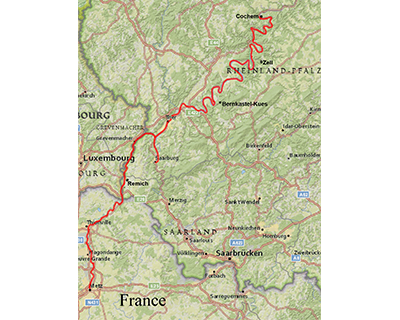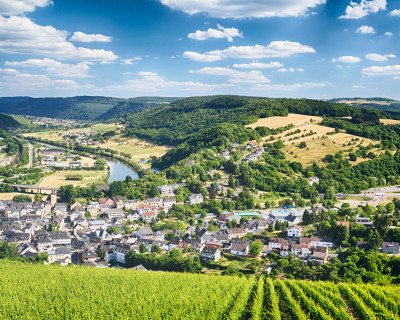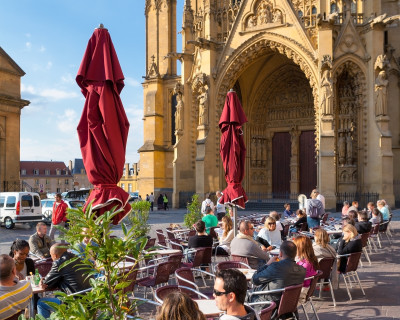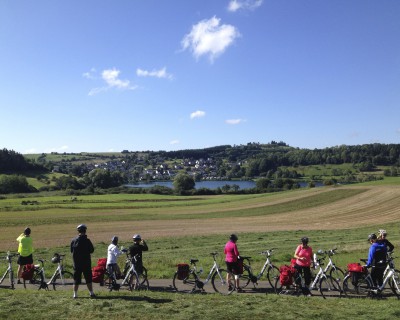Of Romans, Charlemagne and Liquid Gold
The river with 3 names! Is it Mosel, Moselle or Musel?
Well, that depends on where you are on the river as it forms a natural border with three countries we visit: Germany, France, and Luxembourg. It’s a bike and barge dream-come-true. Paved bike paths, well-marked signage and easy cycling along the Rhine’s largest tributary. Medieval market squares, half-timbered villages, gothic cathedrals and castle ruins. Wunderbar and Fantastique are the words to know!
We follow the breadcrumbs of history. The Romans “civilized” this “barbaric” region bringing their culture and the first grapevines. Little did they know at the time of Julius Cesar that this river valley would blossom into a Riesling drinkers’ paradise. On both sides of the river, the precisely-tended vineyards hug the steep slopes. We promise you the ride of a lifetime with lots of sampling along the way.
We meet up in Metz, one of the last Roman city’s to fall to Atilla the Hun and ancestral home of the Merovingian Dynasty. Metz has great architecture from the centuries and a Gothic cathedral that took 300 years to build.
We start biking through the Lorraine region, birthplace of French military heroine Joan of Arc. Ooh-la-la the food out here! Those wonderful breads, Quiche Lorraine, delicate Madaleine cookies and golden Mirabelle plums you’ll find in jams, tarts and a sweet liqueur—the nectar of Gods.
Onto Luxembourg, the only Grand Duchy in Europe. It’s strategic position between two super powers made it a hotly contested area to control over the ages. If you know a little French and German, you’ll understand their mother tongue—a rich soup of both languages in one pot.
And then: Germany! The lead city on this trip is Trier. Never heard of it? You’re not the only one. It’s hey-day was around 2nd century AD. Known as Roma Segunda at the time, Trier was an Imperial Roman city. Kind of a big deal when Constantine the Great ruled from here. You will see the remnants of this glorious past in Germany’s oldest cathedral, amphitheater, the emperor’s throne hall and famous “black gate,” the blackened remains of the ancient city wall.
Further downstream we get to the heart of the Moselle Valley, with its pictureperfect little towns with hundreds of vineyards and wineries. Gently cycling along the Riverside we reach our final destination at the feet of the Reichsburg of Cochem.
Read moreDay-to-day
-

Metz
Join the barge after you have visited Metz, an ancient city strategically situated on a Roman trading route. St.Etienne Cathedral is France’s 3rd largest Gothic church, with flying buttresses and Marc Chagall stained glass windows. Metz is full of stunning architecture, flowers and great cafes. Worth considering arriving here a day earlier and having a night at a hotel.
-
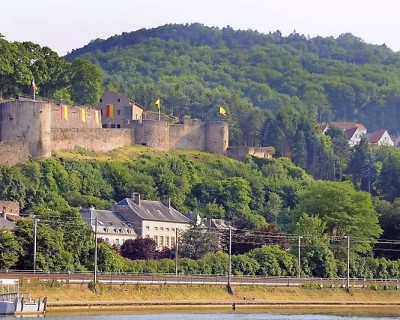
Metz - Remich
Today we leave France behind and look to Luxembourg and Germany. For centuries, this territory has been more French than German. German, then French. You get the idea. Thionville was the centre of the steel industry until the 1980s. That might sound modern and industrial, but the city is ancient. The historical centre shows us the medieval ramparts, lovely gardens, old streets and St.Maximin basilica, which houses one of the finest organs in the world. Thionville is also part of the infamous Maginot line, an enormous defence network of forts and bunkers built between World Wars against the Germans. It failed miserably—one of the worst military strategies ever conceived. After spending millions on it, the Germans marched around in their Blitzkrieg warfare style. We pass the fortress high up on the rocky outcrop, one of the palaces inhabited by the powerful Dukes of Lorraine. The route is lovely French countryside, riparian landscapes and tiny villages. We ride past wheat fields and pastures of white cows (Charolais) praised for their strength as draft animals and excellent meat! We end our tour in Remich, on the Luxembourgian side of the Mosel, Germany on the other.
-
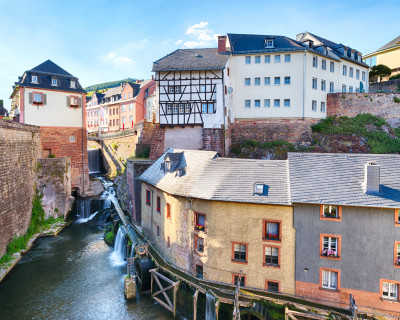
Remich - Saarburg
We take you to a hidden gem. It’s a great story of historic preservation…imagine you’re a farmer in 1852 and you’re tilling your field. Suddenly, these colorful square pieces start appearing in the plough sod. What that farmer soon discovered was pieces that belonged in a tiled mosaic floor—dating back 1,600 years! The tile floor which lies in its original place, was once the centerpiece in a palatial Roman villa. The scene (in 3 million individual tile pieces) reveals scenes from gladiator games in the amphitheater. It’s breathtaking and original.
We pedal toward Luxembourg. Don’t let the size fool you; Luxembourg is a vital finance centre and EU administrative city. We have a stop in Schengen where the European Union created the Schengen Agreement, enabling European free traffic.
Our path leads us to a place that’s a throwback in time. The name Saarburg means “fortress on the river Saar” to give you a hint of what to expect there. The ruins date back to the 10th century, a summer palace for the Archbishops of Trier—powerful men and power brokers in the Holy Roman Empire. We love Saarburg. There’s a natural, steep drop between the “upper and lower” towns, but they’re connected by a high waterfall. Town fathers back in the 1300s diverted a local river to run through the centre so they’d have access to water to fight fires quickly and have continual energy to run their mills. This is well-preserved in the 17th-18th century homes that cling to the hillside. It’s medieval German engineering at its best.
-
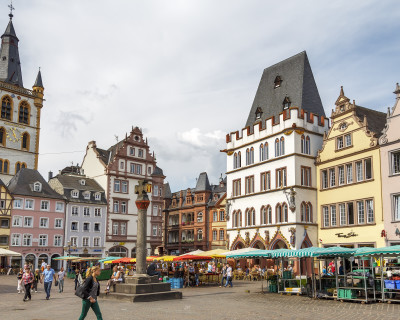
Saarburg - Trier
We bike on to Trier, leaving the Saar river and following the Mosel again, into this lively university town, powerful Arch-diocese, and Imperial Residence of Constantine the Great. All roads lead to Rome as they say, but in this case our road leads to Trier, the 2nd Rome in the 3rd century. The history is fascinating. More than you’d expect on the sleepy Mosel. Great museums. Superb shopping. A gem of a city.
-
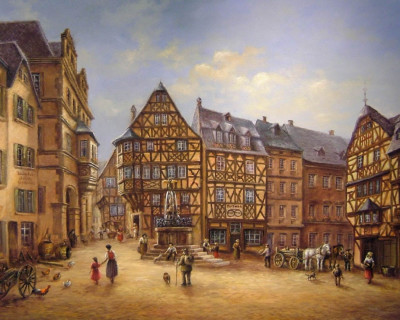
Trier - Bernkastel
The wide river valley is now showing us vineyards as far as the eye can see. We pass the heavy-hitters in the wine world: Trittenheim lies in a sharp hairpin turn on the river surrounded by mountains coated with grapes. The chapel in the vineyard is one of the most photographed on the river. Piesport, Brauneberg and finally Bernkastel, the darling of the famed middle Mosel. This is Valhalla for Riesling aficionados. A good size village with great shopping, wine bars and ice cream. One of the prettiest town squares with timber-frame buildings dating back to the 1400s! The castle ruins on the hill are base-lit at night. An evening stroll along the river is a must…words can’t describe the feeling of Old Europe.
-
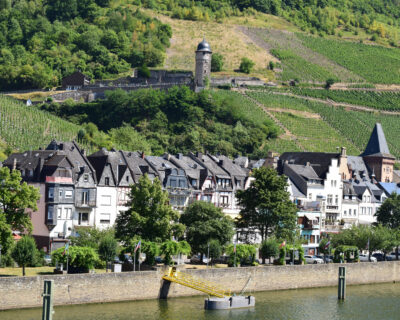
Bernkastel - Zell
We are now in the hearth of the wine producing Moselle Valley, cycling through the vineyards.
Our bike journey follows the river upstream passing the steepest vineyards in the world to arrive in Zell, a beautiful hamlet where the river slices through slate mountains in dramatic oxbows and S turns. Zeller Schwarze Katz (black cat) is a legendary Mosel Wine.
-
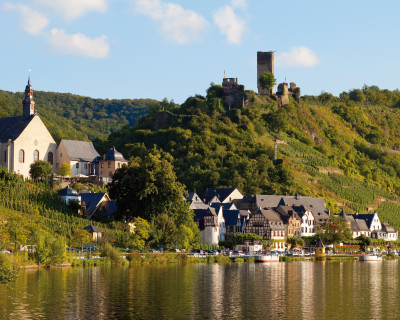
Bernkastel - Cochem
Another Mosel Beauty: Traben-Trarbach; this town features world-class Art Nouveau architecture that proves its great importance in the international wine trade during the 19th century. And then the Sleeping Beauty on the Mosel. It’s a precious medieval village called Beilstein. It has been the backdrop for many German films. You will have the chance to see the revered and rare relic, the Black Madonna, in the chapel of the Carmelite Monastery overlooking the valley. Great photo ops here. After the visit, our journey follows the river downstream, passing a last lock and docking in Cochem, a bustling and characteristic Mosel town with steep wine-clad mountains, wooded hills, an impressive castle and a picturesque square with beautiful timber-framed houses and cafes. You can visit the castle, have a glass of local wine, or both!
-
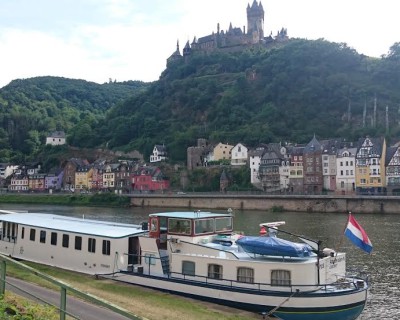
Cochem
Time to say goodbye, your tour ends after breakfast. You can leave your luggage on board until lunchtime, and visit Cochem a bit more
Accommodations
-
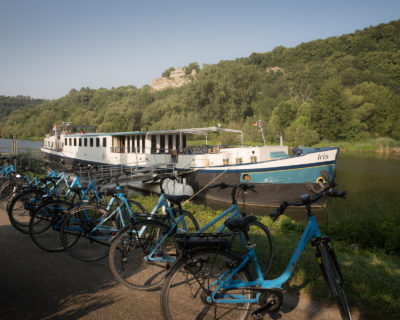
passengerbarge IRIS
One of the best: our premium barge IRIS, sailing since 2005. Fully air-conditioned, lovely front sundeck, lounge and dining area and self-service Bar. Delicious 3 course dinners and packed lunches. Lots of options at Breakfast.
-
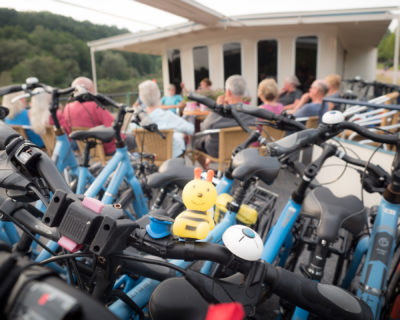
Ready to dock!
If you do not feel like cycling you are welcome to stay on board and have a private cruise!
-
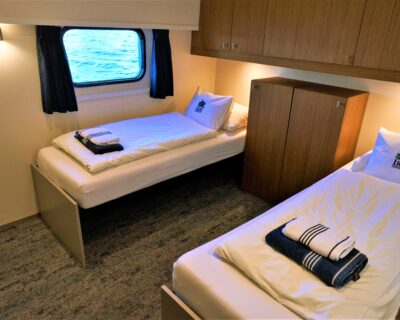
Cabins
Your air-conditioned cabin has two comfortable separate beds or is turned into one double bed, size 160 cm x 200 cm. There is enough storage, including your suitcase. Ensuite your private bathroom
-
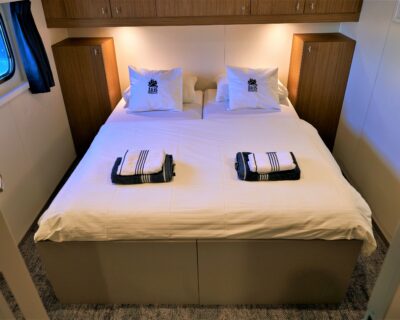
One double bed
About queen size, for our couples
-
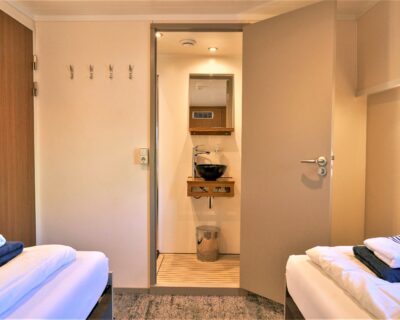
Ensuite Bathroom
Sleek and contemporary, “shippish” style
-
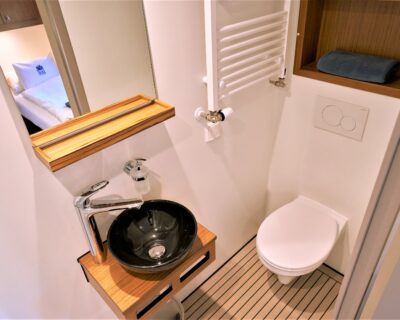
toilet
have a look at the right side
-
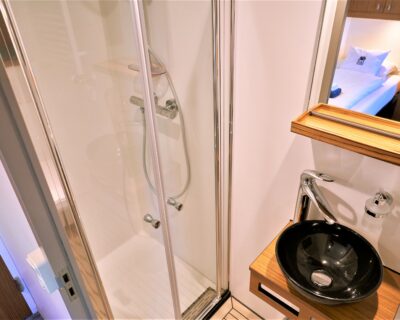
shower
at the right side, with doors open in both directions, this is your perfect spot for a splash of cold water or a warm shower anytime.
-
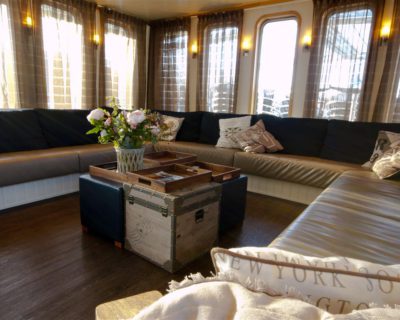
Lounge
Perfect to enjoy a cold beer or glass of Pinot Gris from our self-service Bar.
-
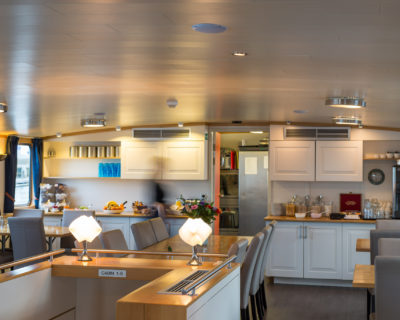
Our breakfast/dinner area
Space to enjoy breakfast and dinner, and also the place to sit down to write/online surfing/card games/board games/after dinner chats….
What’s Included on this tour:
- Seven nights onboard
- Bed linen and towels
- Breakfast
- 6 x dinner onboard + complimentary glass of wine/beer at dinner
- Packed lunches for bike trips
- Coffee and tea on board
- Tour guide (from 18 guests 2 guides)
- Cabins cleaned daily
- Climate-controlled cabins
- Bikes, Helmets, panniers and waterbottle
- Wine tasting
What’s Not Included:
- Bike rental € 110,– per bike 2024, € 120,– in 2025
- E-bike on availability, € 220,– per E-bike 2024, € 250,– in 2025
- Entrance fees for museums and monuments, on your own
- Travel and cancellation insurance
- Miscellaneous beverages and expenses on excursions.
- Gratuities for Staff and Guides
